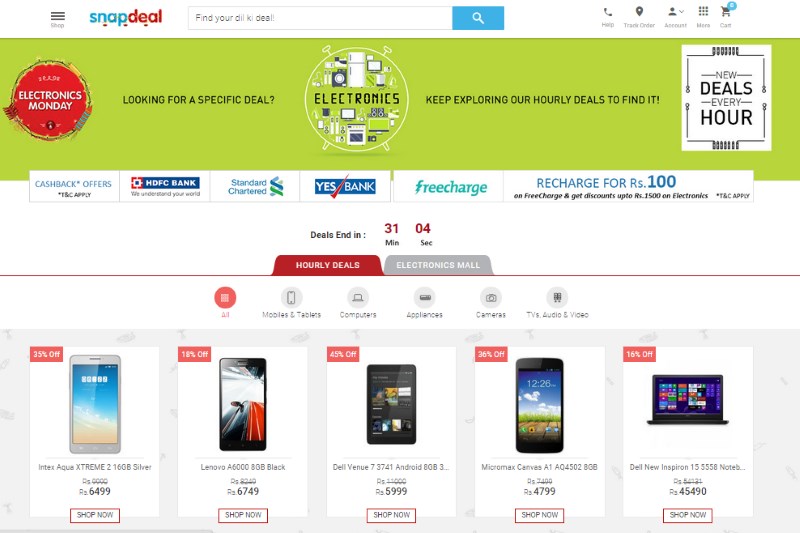- Home
- Internet
- Internet Features
- Snapdeal Diwali Sale: Exaggerated Discounts Dampen the Spirit of Electronics Monday
Snapdeal Diwali Sale: Exaggerated Discounts Dampen the Spirit of Electronics Monday

A small number of the deals caught our attention, such as the 16GB and 64GB iPhone 6 at their lowest ever prices (without cashback offer) and very tempting Xiaomi Mi Pad which also had a healthy chunk cut out of its cost.
(Also see: Snapdeal Diwali Sale: The Best Electronics Monday Deals)
While Snapdeal has been able to cope with the massive load, with the site and the apps continuing to work fine - no small achievement in itself - everything else was not as exciting. Gadgets 360 has monitored the Electronics Monday sale through the day and has found several cases in which pre-sale prices seem to have been artificially inflated in order to make the discounted deals seem more appealing than they actually are. Several products are being promoted at prices not too far off from their everyday retail prices.
(Also see: Snapdeal Electronics Monday Sale Part of Our 'World Cup Final', Says Chandrasekaran)
Many of the phones on offer are actually quite old, and as such, there are better products available even when factoring in a minor discount. For example, the Micromax Canvas Spark was launched in April this year at Rs. 4,999. Snapdeal offered it today for Rs. 4,799 but advertised the MRP to show Rs. 7,249 for a claimed 34 percent off. The Karbonn Titanium S200 HD is also on sale for Rs. 4,799 and also launched for Rs. 4,999, but more recently, in September this year. Its price has been inflated less, to Rs. 5,990, for a purported 20 percent discount though you're actually getting only Rs. 200 off.
The Micromax Canvas Fire 4 and Micromax Canvas Nitro 2 were on sale for Rs. 4,999 and Rs. 7,999 respectively, which are reasonable compared to their launch price of Rs. 6,999 and Rs. 10,990 respectively. However, street prices tend to slide after launch and so these low rates are not anything to get excited about. Perhaps to counter that effect, Snapdeal hiked the regular price to Rs. 8,299 and Rs. 12,249 and is making the discount seem more significant.
The same effect could be seen in listings for the Yu Yunique, which has been sold only through controlled channels so far, allowing the company to eliminate street price variations. Without a lower MOP to claim as its own, Snapdeal has again pushed up the price to Rs. 6,999 from the clearly stated launch price of Rs. 4,999 in order to fib a 29 percent discount. The actual benefit to buyers? Zero. Absolutely nothing.
The Intex Cloud Pace was listed for Rs. 5,099 today which was supposedly 38 percent lower than the MRP of Rs. 8,290. Except that the actual price is Rs. 6,999 as we noted at the time of its launch in August this year. If you think it's only low-cost Android models that are affected by this wave of price revisions, we also found a Microsoft Lumia 640 XL listing which happily claimed that the offer price of Rs. 13,499 was a steal, at 21 percent off. Pants on fire, Snapdeal. The phone in question was launched for Rs. 15,799.
In many cases, these are still good prices to pay for smartphones. Snapdeal could simply promote its everyday low prices without resorting to artificial inflation. Maybe it just wants to get rid of stocks of unpopular products such as the HTC Re Cam, which is listed at Rs. 5,490 for Electronics Monday, but inflated from its actual price of Rs. 9,990 to Rs. 10,990 to seem like a better deal.
By far the most egregiously misleading and disingenuous offer had to be the listing for Asus' GeForce GTX 960 with 2GB of RAM. The card officially launched in January for Rs. 19,500 but its street price was always around Rs. 16,500. Snapdeal was promoting it for Rs. 15,889 today which is not a bad deal at all - except for the "36 PERCENT OFF" label against what seems like an entirely fictitious price of Rs. 25,000.
As we've stated, there were some interesting and genuinely tempting deals today. In addition to those already covered, we found a WD Elements 1TB portable hard drive for Rs. 3,699 and a 2TB Toshiba Canvio model for Rs. 5,675. While not record-breaking, it isn't easy to find these products at these prices and anyone who needs some portable storage should pick them up - just don't get too excited about the claimed discount values.
The Intel Compute Stick, publicly launched for Rs. 9,999, was selling on Snapdeal today for Rs. 8,999 with a free wireless keyboard and mouse - another pretty compelling deal. So why did the site have to advertise the price as Rs. 12,900? This package clearly could have been sold on its own merits.
Snapdeal is not alone in using prices that are higher than market launch prices in order to make its prices look better - we've seen this before from multiple major players. While these prices may indeed be the MRP printed on the box, as the launch stories we linked to prove, the products were never sold - or even advertised to be sold - at that price. Using these prices to advertise deals - which all e-commerce players do, during, and even outside the big sales - is a sad reflection of state of the Indian market, and one that can mislead customers.
Disclosure: Gadgets 360's new Shop section may be seen as a competitor to Snapdeal.
Catch the latest from the Consumer Electronics Show on Gadgets 360, at our CES 2026 hub.
Related Stories
- Samsung Galaxy Unpacked 2025
- ChatGPT
- Redmi Note 14 Pro+
- iPhone 16
- Apple Vision Pro
- Oneplus 12
- OnePlus Nord CE 3 Lite 5G
- iPhone 13
- Xiaomi 14 Pro
- Oppo Find N3
- Tecno Spark Go (2023)
- Realme V30
- Best Phones Under 25000
- Samsung Galaxy S24 Series
- Cryptocurrency
- iQoo 12
- Samsung Galaxy S24 Ultra
- Giottus
- Samsung Galaxy Z Flip 5
- Apple 'Scary Fast'
- Housefull 5
- GoPro Hero 12 Black Review
- Invincible Season 2
- JioGlass
- HD Ready TV
- Laptop Under 50000
- Smartwatch Under 10000
- Latest Mobile Phones
- Compare Phones
- Tecno Spark Go 3
- iQOO Z11 Turbo
- OPPO A6c
- Samsung Galaxy A07 5G
- Vivo Y500i
- OnePlus Turbo 6V
- OnePlus Turbo 6
- Itel Zeno 20 Max
- Lenovo Yoga Slim 7x (2025)
- Lenovo Yoga Slim 7a
- Lenovo Idea Tab Plus
- Realme Pad 3
- Garmin Quatix 8 Pro
- NoiseFit Pro 6R
- Haier H5E Series
- Acerpure Nitro Z Series 100-inch QLED TV
- Asus ROG Ally
- Nintendo Switch Lite
- Haier 1.6 Ton 5 Star Inverter Split AC (HSU19G-MZAID5BN-INV)
- Haier 1.6 Ton 5 Star Inverter Split AC (HSU19G-MZAIM5BN-INV)

















